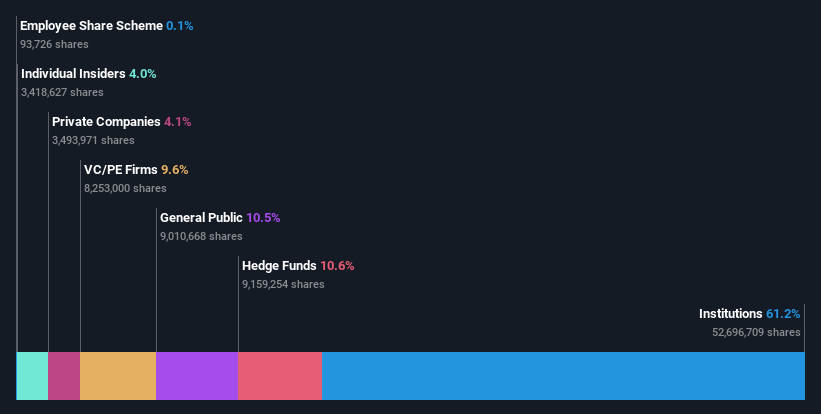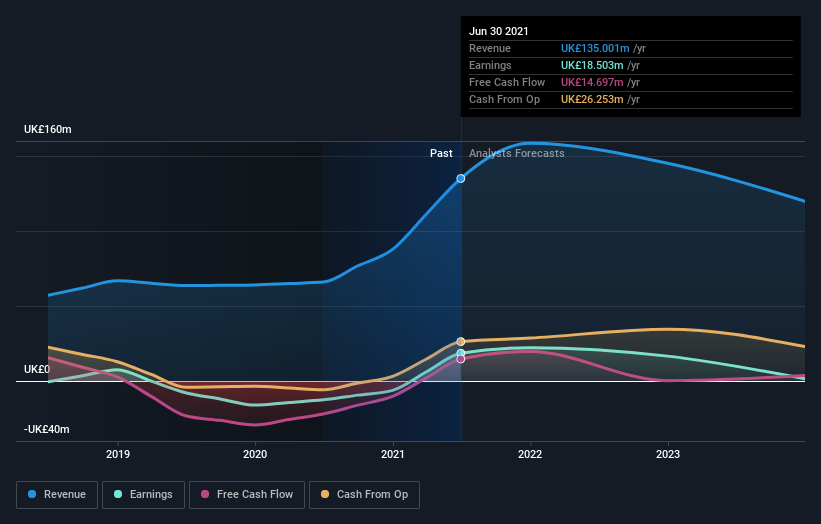What Type Of Shareholders Own The Most Number of Oxford Biomedica plc (LON:OXB) Shares?
Every investor in Oxford Biomedica plc (LON:OXB) should be aware of the most powerful shareholder groups. Insiders often own a large chunk of younger, smaller, companies while huge companies tend to have institutions as shareholders. Companies that used to be publicly owned tend to have lower insider ownership.
With a market capitalization of UK£1.0b, Oxford Biomedica is a decent size, so it is probably on the radar of institutional investors. Taking a look at our data on the ownership groups (below), it seems that institutional investors have bought into the company. Let's delve deeper into each type of owner, to discover more about Oxford Biomedica.
View our latest analysis for Oxford Biomedica
What Does The Institutional Ownership Tell Us About Oxford Biomedica?
Institutions typically measure themselves against a benchmark when reporting to their own investors, so they often become more enthusiastic about a stock once it's included in a major index. We would expect most companies to have some institutions on the register, especially if they are growing.
We can see that Oxford Biomedica does have institutional investors; and they hold a good portion of the company's stock. This suggests some credibility amongst professional investors. But we can't rely on that fact alone since institutions make bad investments sometimes, just like everyone does. If multiple institutions change their view on a stock at the same time, you could see the share price drop fast. It's therefore worth looking at Oxford Biomedica's earnings history below. Of course, the future is what really matters.
Investors should note that institutions actually own more than half the company, so they can collectively wield significant power. It looks like hedge funds own 11% of Oxford Biomedica shares. That catches my attention because hedge funds sometimes try to influence management, or bring about changes that will create near term value for shareholders. Vulpes Investment Management Private Ltd is currently the largest shareholder, with 11% of shares outstanding. Novo Holdings A/S is the second largest shareholder owning 9.6% of common stock, and M&G Investment Management Limited holds about 6.6% of the company stock.
Looking at the shareholder registry, we can see that 51% of the ownership is controlled by the top 11 shareholders, meaning that no single shareholder has a majority interest in the ownership.
Researching institutional ownership is a good way to gauge and filter a stock's expected performance. The same can be achieved by studying analyst sentiments. There are plenty of analysts covering the stock, so it might be worth seeing what they are forecasting, too.
Insider Ownership Of Oxford Biomedica
While the precise definition of an insider can be subjective, almost everyone considers board members to be insiders. Company management run the business, but the CEO will answer to the board, even if he or she is a member of it.
Most consider insider ownership a positive because it can indicate the board is well aligned with other shareholders. However, on some occasions too much power is concentrated within this group.
Our most recent data indicates that insiders own some shares in Oxford Biomedica plc. The insiders have a meaningful stake worth UK£41m. Most would see this as a real positive. It is good to see this level of investment by insiders. You can check here to see if those insiders have been buying recently.
General Public Ownership
With a 10% ownership, the general public, mostly comprising of individual investors, have some degree of sway over Oxford Biomedica. While this group can't necessarily call the shots, it can certainly have a real influence on how the company is run.
Private Equity Ownership
With an ownership of 9.6%, private equity firms are in a position to play a role in shaping corporate strategy with a focus on value creation. Sometimes we see private equity stick around for the long term, but generally speaking they have a shorter investment horizon and -- as the name suggests -- don't invest in public companies much. After some time they may look to sell and redeploy capital elsewhere.
Private Company Ownership
We can see that Private Companies own 4.1%, of the shares on issue. Private companies may be related parties. Sometimes insiders have an interest in a public company through a holding in a private company, rather than in their own capacity as an individual. While it's hard to draw any broad stroke conclusions, it is worth noting as an area for further research.
Next Steps:
It's always worth thinking about the different groups who own shares in a company. But to understand Oxford Biomedica better, we need to consider many other factors. Case in point: We've spotted 3 warning signs for Oxford Biomedica you should be aware of, and 1 of them is concerning.
If you would prefer discover what analysts are predicting in terms of future growth, do not miss this free report on analyst forecasts.
NB: Figures in this article are calculated using data from the last twelve months, which refer to the 12-month period ending on the last date of the month the financial statement is dated. This may not be consistent with full year annual report figures.
Have feedback on this article? Concerned about the content? Get in touch with us directly. Alternatively, email editorial-team (at) simplywallst.com.
This article by Simply Wall St is general in nature. We provide commentary based on historical data and analyst forecasts only using an unbiased methodology and our articles are not intended to be financial advice. It does not constitute a recommendation to buy or sell any stock, and does not take account of your objectives, or your financial situation. We aim to bring you long-term focused analysis driven by fundamental data. Note that our analysis may not factor in the latest price-sensitive company announcements or qualitative material. Simply Wall St has no position in any stocks mentioned.

 Yahoo Finance
Yahoo Finance 

